The vigorous Venezuelan opposition movement that could have dethroned Nicolás Maduro in this year’s presidential election has evaporated.
About 100 leaders and many more activists from the Plataforma Unitaria have fled the country since Maduro unleashed an intense wave of repression after his disputed victory on July 28. Edmundo González Urrutia, now called president-elect by the United States, fled to Spain in September. Popular opposition leader María Corina Machado has been in hiding since early August, supposedly within Venezuelan borders, although the government says she is in Colombia.
All this is because Maduro has made his enemies fear for their lives. The homes of his detractors were spray-painted with the letter X and visited by security force agents in the framework of the so-called “Tun-Tun” operation.
At least 25 arrest warrants against opposition leaders were issued in the first month after the election. Dozens of passports were cancelled. Many were publicly identified and threatened on state television.
The situation reached a deadly climax in late October, when Apure state opposition leader Edwin Santos was found dead after being detained by security forces for two days, according to his party. The government never acknowledged his arrest and said he died in a motorcycle accident.
The ruling party and its allies have also been considering several laws that ultimately seek to eliminate all traces of opposition within the country. Maduro is scheduled to be sworn in on January 10, and parliamentary and regional elections for governors, mayors and other lawmakers will be held later in the year.
“On July 29, Maduro swept away the electoral system as we knew it,” said University of Navarra professor and political consultant Carmen Beatriz Fernández. “If elections were to take place next year,” he added, “it would be a very convenient election where each candidate must have the placebo, the approval of the dominant nomenclature, in order to be able to enter the ring.”
authority
At the most oppressive moment of his autocratic rule so far, Maduro is on track to get what he wants: a Venezuela with no-one to question his authority. Even if the United States refuses to recognise his presidency, it won’t make much of a material difference, given that the once-fervent opposition is only a shadow of its former self. The government did not respond to a request for comment.
Had things been different, Viviana Save Torres would have considered running as a candidate in the opposition primaries for any of next year’s elections. However, the party organiser is thousands of miles from home after the government launched a manhunt against her. She asked Bloomberg News not to publish her location for fear of her safety.
The 34-year-old helped organise the opposition primary last year and coordinated González Urrutia’s campaign in her home state of Trujillo.
González Urrutia, a former diplomat, ran with the support of Machado, who was barred from running for public office. Having her help on the campaign trail was key: Machado won the opposition primary with 93 percent of the vote, and Venezuelans came to see her almost as a messianic figure who promised to reform the economy and reunite families separated by the largest diaspora in the Western Hemisphere. The opposition eventually offered evidence showing González Urrutia would likely have won nearly 70 percent of the presidential vote.
But for Save, the intimidation began in the weeks before the election, when security forces stationed themselves outside her home. As a precaution, she changed her location and even her car up to three times a day.
It all got worse in the days after the vote. The ruling party governor in Trujillo shared wanted posters for Save and six other local opposition leaders on his social media account. Security forces found the place where they were staying the next day and arrested one of them. Save managed to escape while agents questioned neighbours.
On August 4, she learned that the government had issued an arrest warrant for her and decided to leave. She didn’t even have time to tell her family. That night at 2am, she crossed the border into Colombia on a motorcycle. She was barefoot, wearing only her pajamas, and pretended to be sick.
“It was a week of terror,” she said. “When I got to Cúcuta, I felt relieved.”
Sadly, her journey was far from over.
Shortly afterward, the governor of Trujillo addressed her on regional television, telling her that the government knew where she was and that they would find her and deport her to Venezuela.
Save barely went outside in Colombia; she was too afraid to even go to the grocery store, so she left. “This whole wave of terror is the reaction of some defeated people who want to perpetuate themselves in power,” she said in a telephone interview. “My call is to the international community: you cannot be complacent.”
Wave of persecution
While González Urrutia is the most prominent leader to have left so far, there are many others like Save who were instrumental in enabling the opposition to reach out to its supporters and carry out a campaign against the ruling socialists. There are also those who served as vote-counting witnesses and polling station employees, who have also received direct threats from Maduro’s security forces.
Of course, some remain in hiding within Venezuelan borders. And there are six close Machado aides who remain holed up in Argentina’s Embassy in Caracas, now under Brazilian control. Over the weekend, the opposition said the government had resumed its siege of the Embassy by cutting off electricity and placing signal jammers.
The onslaught has been especially harsh against Machado’s Vente Venezuela party, but this has happened to others before. Most of the leaders of the once-powerful opposition groups Voluntad Popular and Primero Justicia are in exile, and some of their most prominent leaders have faced the possibility of prison time.
Many of those who fled after the July election refused to share their testimonies for fear that any clues to their identity could lead to reprisals. Another young opposition leader, who asked to remain anonymous, left after an arrest warrant was issued and security forces raided his home. The individual had helped organise opposition primaries in 2023 and, like Save, hoped to run for office next year.
The situation is expected to worsen in the coming weeks, and Maduro’s government may pass electoral reforms seeking to exclude the opposition and its parties before the December 15 deadline.
Simultaneously, authorities are investigating more than 300 people, mostly politicians, for what it says was the theft of Citgo Petroleum Corp, the US arm of Venezuela’s state oil company. In 2019, the Venezuelan government lost control of Citgo to an ad hoc opposition-led board. The company is now being auctioned off in the United States
“Hopefully all those involved in the blatant Citgo theft will be prosecuted, captured, and brought to trial,” Maduro said on the October 28 episode of his weekly television show.
The latest wave of persecution against Maduro does not appear to be over yet.
He is also promoting a law to counter the US “Bolívar Law,” which provides for sanctions such as lifetime bans from holding public office, trials in absentia, and 30-year prison sentences for those who support actions against Venezuela. The legislation was pushed by Florida Congressman Mike Vals, who is US president-elect Donald Trump’s nominee for national security adviser.
The repercussions of this and the electoral reforms will be felt for years to come.
“While some opposition forces will likely participate in the elections anyway, it is hard to imagine the opposition remaining completely unified in its approach to the election after the blatant fraud in July,” said Risa Grais-Targow, an analyst at Eurasia Group.
“It is always in Maduro’s interest to have a divided and demoralised opposition, especially in the run-up to a vote.”
related news
by Bloomberg News


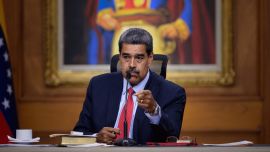





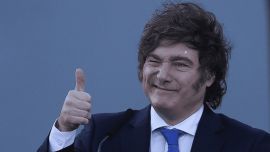
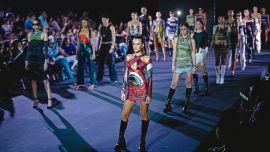
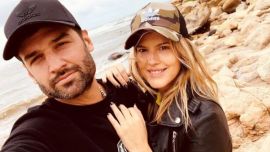






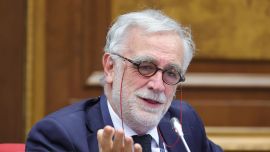



Comments